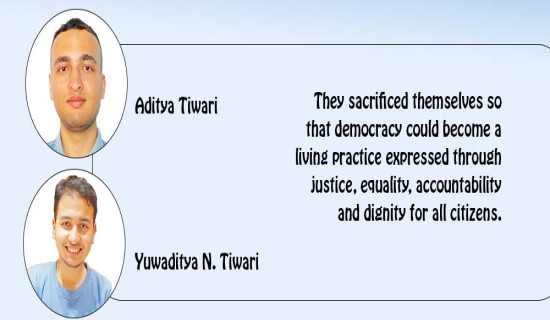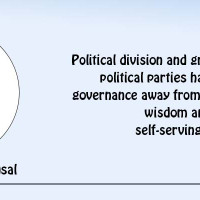- Friday, 30 January 2026
Brain Gain For Development
If there is one urgent function, among many, that the freshly mandated government has to prioritise, it is an attempt to re/gain the drained brain for the nation's overall development. It may be agonizing to witness the sad event that more than one thousand young graduates are leaving Nepal every day, apparently not to return to their homeland. Considering this country's educated population, this number can be called an intellectual exodus. If this exodus continues as it is doing these days, no one can stop the impending deluge of youngsters' flight abroad for better education and lucrative job opportunities. Several governments were instituted after the restoration of democracy, more so after the establishment of republicanism, and have delivered elaborate speeches about the need for brain re/grain, but their talks have proved mere rhetoric far from reality.
Human beings are not born to live cramped life confined to a cabin. They like to move out to other lands to seek, explore, and push their potential beyond boundaries. They are enthusiastic about knowing things afresh. Younger people are still further curious to embrace adventure. In such a context, it is futile for someone to intervene in the conventional path that nature has endowed them with. If we vainly try to stop the natural flow of water, it makes a pond that ultimately crumbles the human-made barrier and makes an explosive flow that may be even more disastrous. The current tendency of youths' unobstructed movement out of their homelands can also be likened to the natural water flow.
Better opportunities
How, then, can we stop young scholars from going abroad since so doing is like going against the natural course? One's desire to move out to seek opportunities is not to blame. Not attracting them to return home after completing their mission is our weakness. No one likes to stay abroad at their choice. Even if they go, they can return home happily after completing their study with new intellectual energy or after earning a handsome amount of money which they can invest in their future. We can see these instances in our northern and southern neighbouring countries, where many youths have returned to their homelands with new knowledge and skills. The same can happen in Nepal also, given that young scholars are offered better opportunities at home. Instead of preventing the scholars from going out through legal restrictions or teaching the lessons of logic, it is far more efficacious to lure them to return home with the prospect of excellent education and lucrative jobs. For this purpose, it has to formulate policies and implement them to help reduce the number of outgoing youths.
An oft-inscribed but never sincerely implemented education policy is to enhance quality. For quality education, the educational field must be politics-free. Contrary to the official policy, government-funded educational institutions are partisan politics ridden. Some teachers have become the most active political actors, who, to their discredit, are infecting their educational institutions by not performing their assigned responsibilities. If the government wants to make education politics-free in a real sense, then this situation must immediately end. Objectionable though it might be, one immediate policy in this regard is that teachers should be denied party membership and discouraged from active involvement in partisan politics.
The next thing that has pestered higher education institutions is the unnecessary involvement of students in partisan politics. This is ungrateful to forget that students had significantly contributed to political change during the autocratic regimes. In a democratic regime, however, the role of students has to change accordingly, with a sincere understanding that their chief aim is academic excellence. At this juncture, political parties should discourage students from engaging in partisan politics during university hours since they can always choose to become political actors in later life.
We need to do more than these policy measures. In action, we should invest more in educational institutions, just as any entrepreneur does in the industry. Whereas huge capital is invested in a factory to produce commodities for consumption, a significant amount of the state should be invested to produce excellent human resources for national development. Nepal is a fertile ground for educational production. This is a land of temperate climate and exquisite natural beauty, where we can attract many thousand foreign students given that we can provide quality education.
In an age of globalization, the internationalisation of higher education has been essential. With a stroke of a pen, this can easily be done if the policymakers and those who are in a position to put the policy into practice are honest in their words and deeds. The next important thing for brain re/gain is to offer lucrative job opportunities for better-educated people. All recruitments should be merit-based rather than based on whether or not one is affiliated with a particular party. The promotion prospects should be based on competence and performance for the assigned tasks, not simply the number of years one has spent in a particular job.
Impartial system
No appointments should be made based on the contribution made to this or that party. A free, fair, and impartial system should be established and followed strictly in all spheres of the state mechanism. Since government jobs are not enough to cater to the growing need of the youth, new employment opportunities have to be created in job markets. Being an agricultural country, Nepal can produce more grains, which can be exported to other countries. Industrial entrepreneurship can also generate more employment.
There is an immense possibility of youth involvement in the country's overall development. When these policies and practices are set in the offing, signs of reform begin to appear. Brain re/gain will be an impossible attempt and a stupid practice if we merely inscribe words in the policy papers but never put those policies into practice. The brain gain center established at the ministry level does not suffice.
(The author is the chairman of Molung Foundation. bhupadhamala@gmail.com)

















